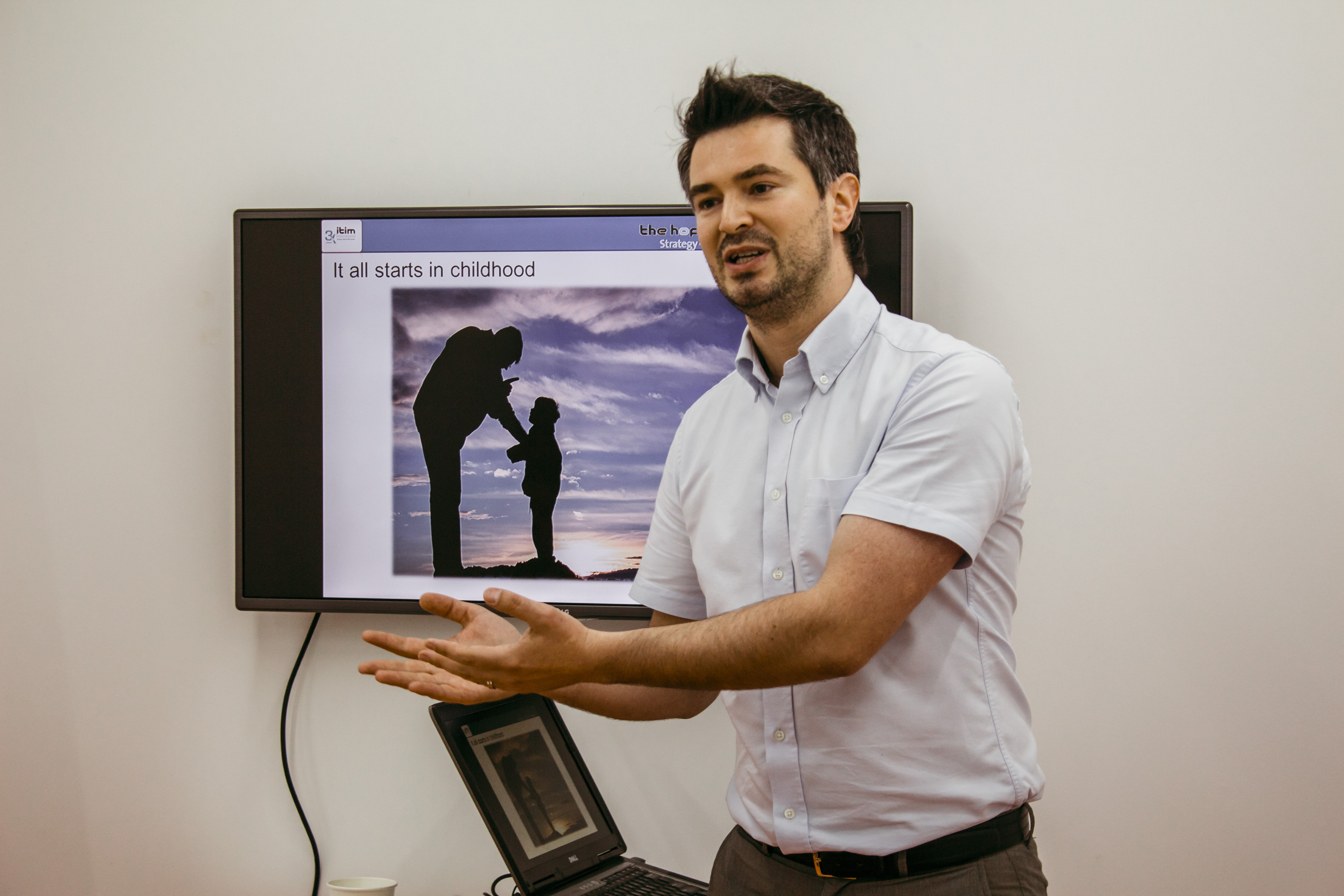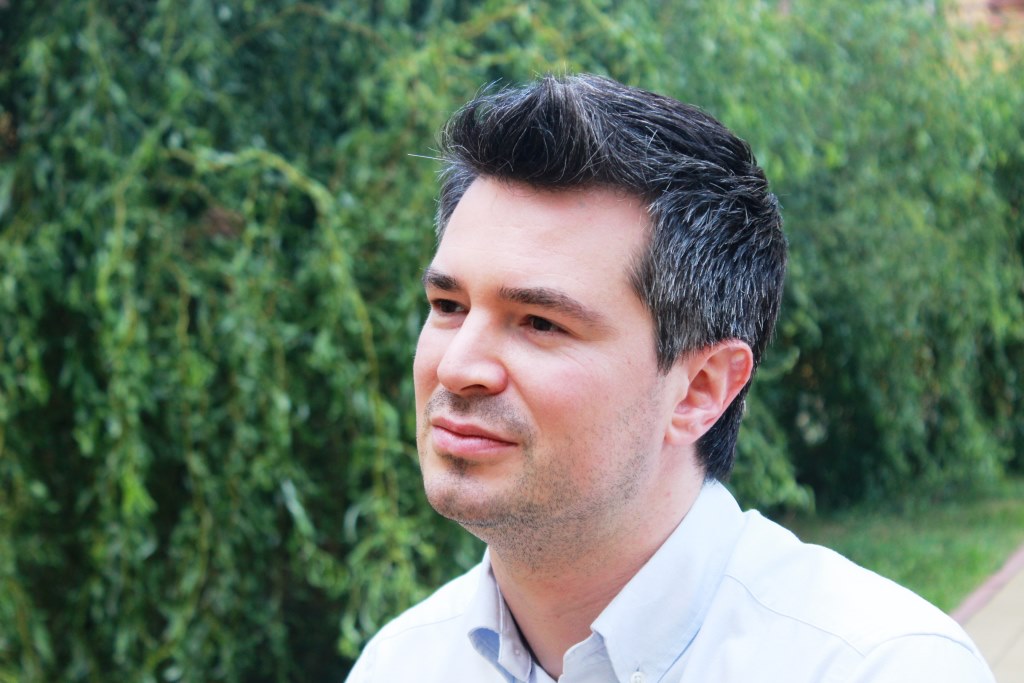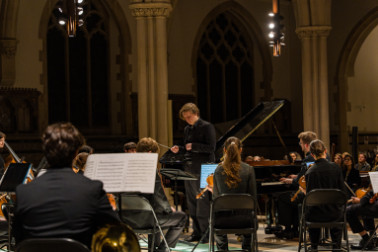George, you have a very interesting profession. Can you please tell us about it?
I am an intercultural practitioner. I am working on corporate psychology in the niche which is called “cultural differences”. This is new for Eastern Europe and most of the people think: “Ok, but <<where is the money?>> How can I use that?” But the thing is that if you, as a businessman, want to empower your people or if you want to engage them into reorganizing the process, you may need it. This is what I am doing now.
As to my background, I am an engineer. I started as a software developer and I worked for 5 years in project management in industrial automation, and afterwards, in operations management.
10 years ago I took a master’s degree in leadership psychology. And at that time I learnt about Geert Hofstede’s methodology. Hofstede is a parent of interculturality. And now, having lived in Ukraine for 4 years, I decided to use only these skills and go on working only with cultural differences.
Of course you can apply them in project management when you work with people from different countries, and I used this knowledge to deliver many international projects.
If we talk about operations management, when you have to lead the people and you have to design the systems to be more productive and to be more efficient, you need to understand what system can work in your country and in your project. One of the things that, unfortunately, we all do wrong here in Eastern Europe is that we import a lot of systems that work in other countries, but don’t necessarily work in our own. We have to design systems comfortable for our people.
The world is changing very fast now and it is all about integration and international approaches. How do you see the future of your profession in this sense?
In my field I work a lot with anthropologists and culture changes actually very slowly. The changes I am trying to implement in Eastern Europe are already used in Western Europe and in the US for the past 30 years in different ways. Of course, the needs for understanding different cultures will become bigger and bigger. So people will need this knowledge to work better and more efficient.
Does it mean that we will be equal in terms of culture?
No. It is proven that actually when you live abroad for many years, you get to value more your own culture. It is a piece of you. There were some theories some years ago saying that all the cultures would converge. But it is not true. Look what is happening now even with the Brexit case. It is a pure cultural thing. It reflects very well the culture of the Brits. They are very individualistic and they are very masculine with low uncertainty avoidance, which leads to the “Yes, we want to do it in our own way, we want to be separate, we are the leaders of the world”.
But they even don’t agree now with their results.
Yes. We don’t talk about politicians now. But these 52% of people believe in that result.
These 52% consist of older generation. May be it is also a question of generations?
Of course, every generation expresses its values in different ways. But the values stay the same.
And, of course, if we talk about cultural changes in the world, there is a question of immigrants. One thing that is noticeable even in London is that people stay in neighborhoods. It is comfortable to live with people who are the same as you and who behave as you do. That is the core of what I am doing. It is all about finding the ways to make it more comfortable for more people.
And that is what most of the international companies don’t know how to do.
So the future of what I am doing is big. You will be able to use it everywhere. And it is a pleasure for me, too.
But can it be a kind of common language for people?
That would mean that the culture is convergent, but it is not. We will fight less because we’ll understand each other better and we will not get into fights so easily. And some behavior that we usually take like: “Look this guy is stepping on my values” will be perceived differently, e.g., you will say: “Ok, I have to step back because this behavior is just a reflection of his values”.
I can give you an example: an Eastern European is going abroad in a very equalitarian culture like Sweden or Netherlands. And he goes there because in Eastern Europe he did very well, he was very efficient. He has brought good results for his company and he goes there to do the same for that subsidiary. He goes there as a boss and starts bossing around. This is something that you can’t do in an equalitarian culture. If you are bossing around, people think that you are arrogant. And they will say: “Hey, you think that just because you are the boss, you can tell me what to do? It does not work like that”. And this guy from Eastern Europe not understanding the culture will think: “Wow, I have to fire these people”. That is the usual reaction. In this case nobody will support you, because you are stepping on their culture.
By using the knowledge about interculturality, it will be clearer how to organize the working processes, but we will not have the same language. We will still think in our own values.
But at least we will know the rules of the game.
Yes. We will know how to adjust to other cultures.
How did this knowledge help you in Ukraine?
When I came to Ukraine I didn’t know Ukrainian at all, but I knew Russian, a little. And then I had to do things: to find a job, to buy tickets, to travel a lot. And if I stopped on the street and asked people in English: “Can you please tell me where the railway station is?” they would just shake their heads like “nonono” and move along. That would give a feeling to a foreigner that Ukrainians are not friendly. And guess what, if I’d stop them and say just one or two words in Russian like “vokzal” (railway station), “gde poezd” (where is the train), “pomogite” (help), something like that, every single one would stop and tell me either in Russian or in Ukrainian what I needed to know. The thing is that they are not unfriendly, it is a reflection of their culture, are we talking about “collectivism”? (I forced them to speak a language they are not comfortable with, and that would “lose face for them”) or are we talking about “femininity”? (which means that they are helpful people) and this is a tendency for them: to help people. And, yes, they will explain you in the best possible way where to go. It was 100% in my case. 
What about work life? How did it help you?
I worked for a Finnish Company in Ukraine. They are very normative, very strict with the rules. The Ukrainians are more pragmatic, and they are more collectivistic. If I’d use the systems that have been offered by the Finns, I wouldn’t have done all the things that I managed to do during this hard period of time in Ukraine. I worked there when the Revolution of Dignity started and when the war began. And we had a subsidiary in Donetsk, so we had to serve the clients there. Plus, in the winter of 2013-2014 the Government decided to cut off the electricity, so we had to be flexible to adjust to that. Without electricity it is not so easy, but in Ukraine you can do it. If you manage to get the support and the loyalty of your people you can do that. You can do it in a pleasant way. Everything depends upon how you use the culture for your advantages. We survived there in a very dramatic period.
Our mentality is pretty close to the Romanian one. What do you like in the Ukrainian mentality and what seams really strange for you?
When you have to do something that involves the state it can be really terrible. You have to be very friendly but even this does not guarantee that you will succeed. Bureaucracy is something exhausting. In Romania these things are changing now. People who work for the state are friendlier with those who search for a good service.
Can you please describe Ukraine from the point of view of cultural dimensions? What kind of country is it?
It is a collectivistic culture, a hierarchical one, fairly pragmatic, but short-term oriented, with high uncertainty avoidance and very restrained and feminine.
And what does it mean practically? Translate please.
We will need at least one day. I gave you the example about hierarchy already. Here you should respect the boss. Collectivistic means that people will stick to the groups. They are very comfortable in groups. Everybody belongs to one particular group. Nice example is that if you go with a tram, you have the group of the passengers who are covering each other and the group of the controllers. The passengers give the tickets to each other. “Hey, look, I don’t know you (may be you are a boss, or a terrible person), but I help you, because we are in the same group, we are the passengers”. This is a simple reflection of collectivism. Yes, not respecting the authorities is also about a hierarchical society. “They are the authorities and we should fight with them”. People help each other and that is why it is a feminine society. But we should not take everything for granted. These are just tendencies. We should combine them to get the way of the society. Most of the Western Europeans or even people from Latin America when come to Eastern Europe notice that people here don’t smile. This is the reflection of a restrained society. Here we (eastern Europeans) believe that if you smile you are goofy while if you don’t – you are serious and an important person. These have much deeper impact in business.
Pragmatism is shown in not following the rules. It is not so bad sometimes. It’s good if you are working in an environment which allows you to do what is the best for the company. If you send a Western European in a country like Ukraine in a hard situation as, for example, in 2013-2014, he would blow off the business most probably. While an Eastern European will use that as an advantage. It does not mean that he is corrupt. I am talking about knowing how to be flexible, not to give bribes or something, but how to survive in complicated circumstances.
Yes, I agree with you. That fact that just after the Revolution of Dignity in very difficult times in terms of economic and political situation a lot of “made in Ukraine” small businesses appeared, just confirms your words. But let’s speak about common things between Ukraine and Romania (your motherland).
Romania passed the way from Ceaușescu regime to the European country. Can we compare our 2 countries from this point of view? How do you see our way of development from Yanukovich regime to European Union membership?
When they took down (young people of 90’s) Ceaușescu, I was sure that the next guy in power would be the best. I remember we had to choose between Iliescu who proved to be a communist and Ion Rațiu who used to live in Germany and knew about democracy a lot. But for some reason I did not like the last one and we did not elect him. I thought that Iliescu was the best. Now looking back I understand that Rațiu would have been the best. After the revolution there were even protests against Iliescu. And he even called some people to beat those who protested. He had power for 6 years. And then we elected a person like President Yushchenko. I make this comparison because you (Ukrainians) did the same. We elected that person because we thought that things would finally change. But that person could not stand the system. After 4 years he said he would not run again. And he did not leave us with somebody else instead of him. And then we had to choose between a communist and an extremist. So we chose the communist (Iliescu). 5 more years passed. Still, things were moving forward. We joined NATO, then we had another liberal man coming to power. He was good for the first term while not so good during the second one. We had better chances for fighting corruption as a candidate for EU. But still it had to come from the inside. EU can help, but if you don’t have people inside, you will pay. We were lucky to get a very professional lady as the head of the Anticorruption Department (Codruta Kovesi). She is really doing a good job. Everybody supports her from the country. She is the hero. You need something like this in Ukraine. And this will come from the new generation. And it has to be a really wise person, someone who understands the system and has a good team to support her/him.
You have to be patient. And now you have the President Poroshenko who is probably the best one you can have now. But there is a long way ahead and a lot of things in terms of real reforms that have to be done for the country. And during the next elections you will have to choose the best one again. 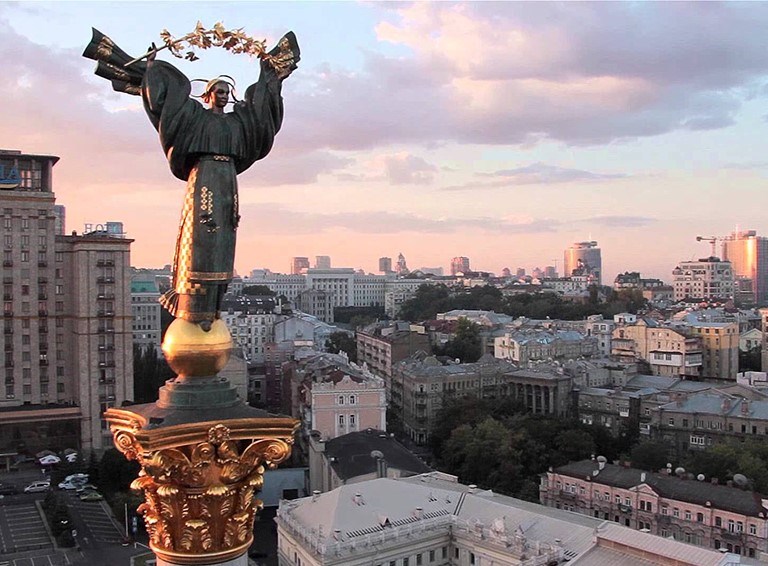
Photo: lyonl.com
What are the important steps we need to make and what can help us?
This is cultural. Ukraine is a hierarchical society. Will you have patience?, will you change the presidents in a democratic way? or you will say: “Nothing really happens and we need to have another revolution”? You need two things for change to happen in a democratic way: a strong civil society and the freedom of speech.
If you don’t have patience you might say: “What am I doing here? Look, all these people are not stamping the tickets and they are stealing from the country these 3 Hryvnia. Yeah, I should do the same”. That is being corrupted at the low level. And a lot of people are like this. Corruption is not just about the government. That is how we at our own levels can influence things. You can say to these people: “Guys, you are stealing from my country”. They can answer: “Yes, but look they are stealing so much more!” But your position could be: “Yes, they will pay for that. Don’t be like them, be better”.
Now in Romania lots of litigation cases have been opened for crimes that took place 25 years ago. This is about patience. Some of the thieves will get away, but some of them will pay. One thing that you need to know is that democracy takes a lot of time. It is not comfortable. Sometimes you need to lose because of the majority. You did not do a good job influencing more people.
And social networks are good tools for doing that better. It is an advantage that Ukraine has now. I wish Romania would have had it 25 years ago. Probably we would not need so much time to implement the reforms. But in Ukraine you have a strong social network. And if you share your ideas, if you influence, if you write the articles in the right way and you manage to catalyze people, you will build the civil society much faster.
Another thing that I would recommend you is to support the independent journalists. The more journalists can write and express themselves without being beaten or threatened or even killed, the better it is for the freedom of speech and for the civil society. And you will have some of them that sometimes will tell you what you don’t like to hear, but this is part of democracy and freedom of speech. It is not something comfortable and it should not be. Overall, you will find out more and more about corruption cases and you will find out more about people who do lots of illegal stuff. Thanks to social media everyone can be kind of a journalist sharing his/her opinions. 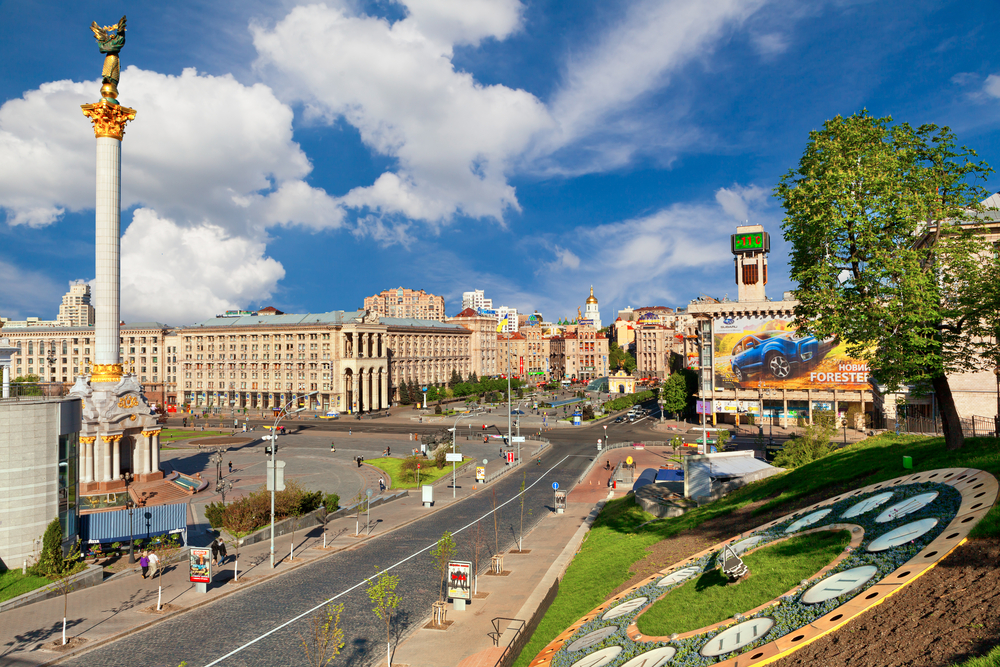
Photo Shutterstock
You should not blame the government, but you should build the strong civil society and guarantee the freedom of speech. Civil Society starts when Helplessness ends. It’s also about patience. If you believe that good things can be done like that, you have to talk about that. If you talk to 3 or 5 people, or 100 people within one day, 1 year, little by little you will influence and your opinion will go viral. That is how you build a new country.
We’ve spent more than 1 hour in a café talking to George about very serious things. But it seems to be never boring or senseless. I was listening to George thinking that I could not even imagine this kind of conversation 5 years ago in my country. Yes, there are some changes. But when I was preparing this interview the news about Pavel Sheremet’s murder, connected to his professional journalistic activity, has appeared in media. I want to believe that this crime will be punished and the notorious freedom of speech will find its place in Ukraine, in particular with the help of a Strong Civil Society and wise politicians.
Interviewed by Anna Vishtak
Ukraine Today: an Intercultural Perspective
Photo: Anna VishtakNowadays there are foreigners living in Ukraine and making their own input in terms of changing the country for the better. But also they search for the better ways for their own success in business in Ukraine. How is it to integrate into another culture and how can we do it in the best way to get all possible profits? Are we all so different and what approach can help us to succeed in a new country, in a new culture? That was the topic of our conversation with George Lupascu-Pruna.
